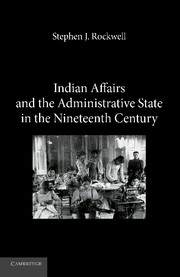Book contents
- Frontmatter
- Contents
- Acknowledgments
- Introduction
- 1 The Myth of Open Wilderness and the Outlines of Big Government
- 2 Managed Expansion in the Early Republic
- 3 Tippecanoe and Treaties, Too: Executive Leadership, Organization, and Effectiveness in the Years of the Factory System
- 4 The Key to Success and the Illusion of Failure
- 5 Big Government Jacksonians
- 6 Tragically Effective: The Administration of Indian Removal
- 7 Public Administration, Politics, and Indian Removal: Perpetuating the Illusion of Failure
- 8 Clearing the Indian Barrier: Indian Affairs at the Center of National Expansion
- 9 Containment and the Weakening of Indian Resistance: The Effectiveness of Reservation Administration
- 10 What's an Administrator To Do? Reservations and Politics
- Conclusion: The Myth of Limited Government
- References
- Index
Conclusion: The Myth of Limited Government
Published online by Cambridge University Press: 06 July 2010
- Frontmatter
- Contents
- Acknowledgments
- Introduction
- 1 The Myth of Open Wilderness and the Outlines of Big Government
- 2 Managed Expansion in the Early Republic
- 3 Tippecanoe and Treaties, Too: Executive Leadership, Organization, and Effectiveness in the Years of the Factory System
- 4 The Key to Success and the Illusion of Failure
- 5 Big Government Jacksonians
- 6 Tragically Effective: The Administration of Indian Removal
- 7 Public Administration, Politics, and Indian Removal: Perpetuating the Illusion of Failure
- 8 Clearing the Indian Barrier: Indian Affairs at the Center of National Expansion
- 9 Containment and the Weakening of Indian Resistance: The Effectiveness of Reservation Administration
- 10 What's an Administrator To Do? Reservations and Politics
- Conclusion: The Myth of Limited Government
- References
- Index
Summary
Toni Morrison has said that studying American history without recognition of the experience of Africans and African Americans renders American history “incoherent.” The same can be said about Native Americans and Indian affairs. Studying the federal government in the nineteenth century – its activities, its development, its relative strengths and weaknesses, and its institutions – without carefully and thoroughly considering the exhausting requirements of westward expansion, the single most important function of that government, is absurd. Studying expansion without carefully and thoroughly considering the role of American Indians and tribes renders American political development incoherent. To recognize the administrative requirements of expansion is to replace the movie myth of the West with a real sense of the scope and activity of the national government from the founding through the nineteenth century. To do so is to erase the myth of limited government.
In Chapter 1, I defined big government loosely as the combination of (1) national, programmatic social, economic, trade, and regulatory policies touching the lives of millions; (2) the bureaucratic capacity, discretionary authority, and administrative autonomy to plan, to innovate, and to effectively implement policies and programs; and (3) an awareness, a sense of the state, seamlessly and inextricably woven into the fabric of everyday life and never far from the consciousness and activity of American society. Big government won the West.
- Type
- Chapter
- Information
- Publisher: Cambridge University PressPrint publication year: 2010



